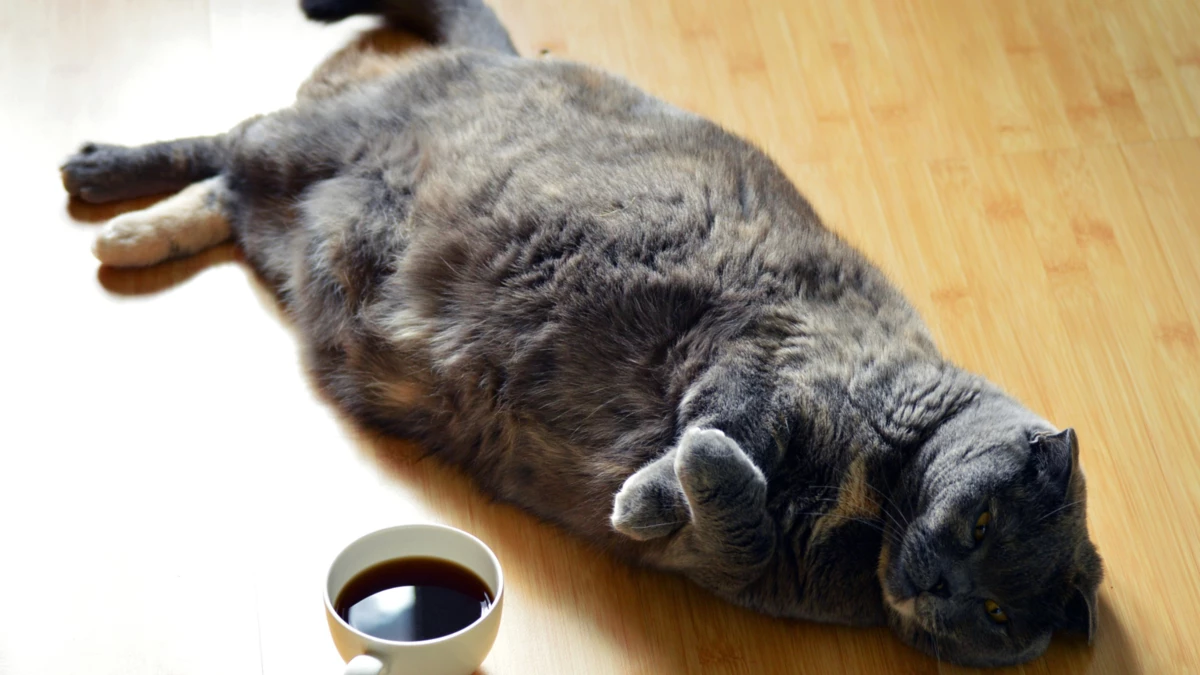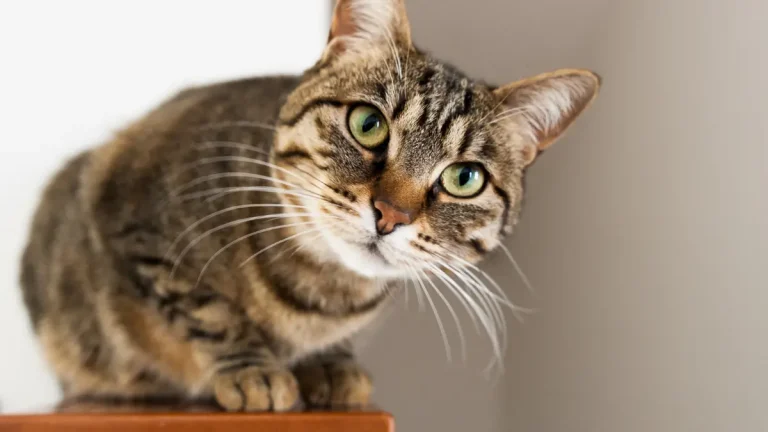Why Does My Cat Headbutt Me?

If you’re a cat parent, you’re probably familiar with the cat headbutt, or as it’s more correctly called, a headbutt. Many people find a headbutt endearing, and in fact, one study showed that shelter cats who hit potential adopters were more likely to be adopted.
So what does it mean Why Does My Cat Headbutt Me? Is it really a show of affection or something more?
What are cat headbutts?
Cats have glands on their cheeks, forehead, and chin that contain pheromones. A pheromone is a substance produced by animals as a type of odor communication. When a cat headbutts you, he is rubbing pheromones on you. The pheromone deposited during headbutting comes from glands located just in front of a cat’s ears.
Humans cannot detect these pheromones, but to a cat, you can consider yourself marked. These pheromones tell other cats that a cat has been there.
The type of headbutt varies from cat to cat. Sometimes a cat will bash you skull-on-skull, which can be a jarring experience. In other cats, headbutting is a much lighter encounter. However, either method will leave you marked with their facial pheromone.
Cat headbutt vS headpress
It is important to note that head butting in cats is not the same as a similar behavior called head pressing. When pressing its head, a cat will compulsively push its head against the wall or corner and will usually not appear relaxed.
Head pressure may also be accompanied by other symptoms, such as rhythm changes, vision changes, or self-harm caused by excessive pressure on the head. If your cat presses its head or shows any other signs, it could be an indication of a serious neurological condition. In this case, your cat should be examined immediately by a veterinarian.
Why do cats headbutt?
Cat facial pheromones have a calming and reassuring effect, so headbutting is a sign that your cat is very happy . Both before and during headbutting, a cat may playfully roll over, purr, have its eyes partially closed, or exhibit other relaxed behaviors.
Alternatively, a cat you don’t know well or at all may headbutt you to sniff you or just feel you out.
These are some of the most common reasons why a cat will headbutt you.
Mark familiar environments
Cats may headbutt and rub their faces on familiar objects like your furniture or cat tree. When cats do this, they are marking objects using the glands in their cheeks. Explore the enchanting world of feline communication as this article delves into the cat purring mysteries. Uncover the reasons behind your cat’s rhythmic vibrations, gaining insights into the emotional, comforting, and health-related aspects that make purring a captivating and mysterious feline behavior.
This type of marking behavior claims a territory as familiar and in a positive way. Think of it as your cat personalizing their environment and creating a safe space, rather than territorially challenging other cats like they would by urine marking or spraying.
Create a cologne scent
Although cats have traditionally been considered solitary creatures, they can actually be quite sociable.
Headbutting is a way for cats to communicate their connection to each other and establish social bonds. When cats within a colony butt heads, they are mixing their scents to create a single scent. This unique scent is then distributed to all cats in the colony as the colony’s scent.
Mark your people or link
Cats mark familiar people just like they mark things around the house. When a cat headbutts you and marks you, it means you’ve been accepted into a very special club: a cat’s inner circle.
By marking you, a cat connects with you through scent and bonding with you. Thanks to their keen sense of smell, much of cats’ communication is done through the smells of their environment. And even if you can’t detect it, the fact that you smell like your cat is very calming to them.
Self calming
When cats rub their faces on something, they are usually purring , happy and relaxed, without anyone else having to intervene. They seem to immensely enjoy head butting and rubbing their faces against things and the smell of their pheromones.
So when cats rub their faces alone, they can calm themselves or regulate their own emotional state. Cats also do this in other ways, such as kneading with their paws, also known as “making cookies.”
Seeking attention
Headbutting is a way for cats to mark you with pheromones and bond with you. However, sometimes headbutting can be a way for cats to seek attention. As a general rule, cats like to be scratched under the chin and on the head, so a cat may only present its head to you for attention and scratching.
If a cat is consistently rewarded with attention after headbutting, then this may encourage more headbutting. Additionally, the more you bond with your cat through headbutting, the more headbutting your cat will do to get attention and bond, in a sort of feel-good cycle.
Looking at a new person
If an unfamiliar or newly adopted cat is head-butting you, it may just be staring at you. Move slowly and feel the cat come out before reacting. You could offer the cat your head to sniff and watch his reaction. If he shows interest in another header, you could try a light return header. If the cat is not on board, he may prefer to scratch his head, after an initial sniff of the hand, of course.

Are cat headbutts a sign of affection?
Cats headbutt to connect with familiar people, making headbutting how cats choose you. So, to a cat, headbutting makes you special. So, if a cat decides you’re worthy of headbutting, consider it the highest of compliments and absolutely a show of affection .
Headbutting your cat back is great, if that’s what your cat likes. If you know they really like a good head butt or a good chin scratch, go for it.
Cats also head-butt other pets in the home as a sign of affection. Other cats will understand the message of goodwill, even if they don’t necessarily appreciate it, while a dog or rabbit may be a little confused.
The boxes are a safe haven
There is great variation between individual cats. Confident cats tend to headbutt more frequently and harder than timid cats. Not only is the more confident cat more likely to headbutt, but it is also likely to be the dominant cat in a multi-cat household. The role of the dominant cat is to deliver the colony’s scent to all the cats in the colony.
Therefore, if your cat does not headbutt, there is no need to be alarmed. Head butting is just one way cats show affection. Cats may also purr, plop down, knead, blink slowly, or sleep next to you.
If your cat used to like headbutting but doesn’t seem to anymore, this change in behavior could mean that he or she isn’t feeling well, especially if you notice other symptoms like lethargy or a bad mood. If this happens, check with your veterinarian to see what may be happening.






